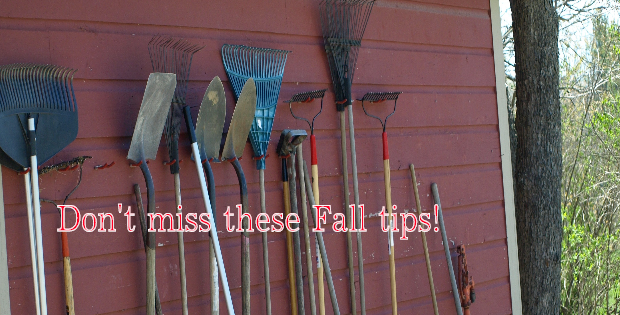We are already officially in Fall, so now’s the time to get your garden ready for the spring time. Here are some tips that you can do before the winter blows her chill over us. We have used the tomato trick for the past few years and it’s really nice to get some of those extra tomatoes after the first frost. I don’t know about you, but I alway treasure my last tomato of the season!
- Shine up those tools– Don’t simply throw those garden tools into the shed. Get them ready for next season! Disinfect and sharpen pruners and other cutting tools. For tools with wooden handles, give them a light sanding and then apply linseed oil. If rust is a problem, use a penetrating oil and then scrub of the rust with steel wool.
- Try a tomato-ripening secret – If you’re like most gardeners this time of year, you probably have lots of unripe tomatoes still on the vine. Try pulling the plants out by the roots and hanging them upside down in a cool, dry place. Your tomatoes will finish ripening in no time.
Image: www.milkwood.net - Plant some of next year’s crops for an early treat – Some vegetables can actually be planted now and will overwinter, giving you an earlier crop next season. Spring cabbage, fava beans, peas and Swiss chard are all examples of crops that can be planted in late summer or early fall.
- Move your fruit– If you’re planning to transplant fruit such as raspberries, strawberries or rhubarb, make sure that you do so well before the first frost. This will give them a chance to establish roots and better stand up to the winter weather.
- Bring herbs indoors– Want fresh herbs at your fingertips this winter? Then go out to your garden and dig up basil, rosemary, thyme and other favorites and bring them indoors and grow them as houseplants. Locate them in a cool and sunny spot and keep the soil moist.
- Make compost– Making your own compost is easy to do and if you start now, you will have beautiful black compost ready for your spring garden next season. Use a combination of leaves, veggie scraps and manure and turn it occasionally with a garden fork. Compost will add much-needed nutrients to your garden and help your plants stay healthy next season.
Image: www.tinygreenhands.com - Add mulch– Adding mulch is a great way to keep weeds at bay and prevent soil erosion. Just make sure you remove any existing weeds first.
- Plant your garlic– If you enjoy beautiful fresh garlic scapes in the spring and flavorful bulbs in the summer, the time to plant is now. Take a few bulbs and separate the cloves, planting them pointy side up before your first frost. The larger the cloves that you plant, the larger the garlic bulbs you will have next summer.
